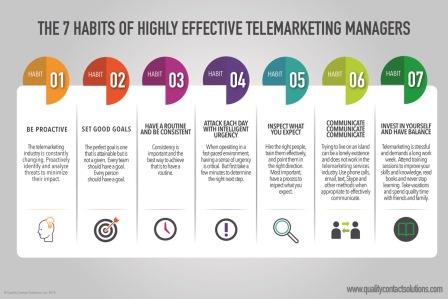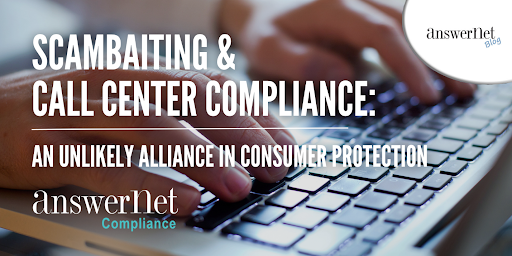By Nathan Teahon, Vice President
The 7 Habits of Highly Effective People by Stephen R. Covey is nothing short of iconic and is a staple on bookshelves of leaders everywhere. There are lessons to be learned by anyone that chooses to pick up the book. I was recently thinking about this book and wondered how I would change the lessons if I was making the list specifically geared towards managers that work in telemarketing services. Below is my attempt to do just that.
1. Be Proactive – Complacency is the Enemy in Telemarketing Services
Okay, so I am cheating on the first one. Being proactive was the first habit in Covey’s book. This is just too important and too foundational to change. However, we can work to define it, and I did add the second part. What does being proactive in telemarketing services mean? This industry is changing by the moment. Analyze threats and try to cut them off at the pass.
I have seen and worked with a lot of call centers in my career. I have seen a lot of call centers thrive, and I have seen a lot of call centers go out of business. The difference in the ones that thrive and those that fail usually comes down to their ability to foresee issues and adapt accordingly. It is easy to live in a reactive state in the telemarketing services industry if that is where you choose to live. This can apply to regulations and compliance, competition, workforce challenges, and the list goes on.
The examples that I just mentioned were at the industry and business level. However, where I see complacency start to grow roots most frequently is at the program level. It usually occurs in long running campaigns that have roughly similar performance month in and month out. If you aren’t proactive, you can look up one day and realize that performance is 20% lower than it was a couple of years back and you are reacting to an issue that has been slowly chipping away at your results over a long period of time.
One way that we at Quality Contact Solutions try to promote proactiveness and new ideas is something that we call our HUG program. HUG stands for “Help Us Grow” and we encourage every person that touches each campaign, from our Operations Managers to our IT staff and most importantly the agents on the front lines to come up with HUGs every month. Essentially this inspires the brainstorming of ideas to ensure that we have a steady flow of new ideas that can help our programs continue to thrive and increase performance. Each month every HUG idea is included on a ballot and we give an award for the HUG of the month. It’s a fun way to encourage everyone to be proactive and fight back against the enemy of complacency.
2. Set Good Goals for Teleservices Success
The telemarketing services industry is unique and like no other. Every campaign and every program are able to be measured by very specific KPI’s. It boggles my mind when I see a call center floor without any marker boards with results, or TV’s on the wall showing everyone on the team how they are doing. It happens, and more than you would think. Typically, in those centers, if you sit down with an agent you will find out they aren’t showing people how they are doing because there are no goals. None that are stated.
I am very passionate about goals. Not to have them is completely asinine. Competition breeds excellence. Competition against personal bests, against the person sitting next to you, against that other call center that you are competing against. People more engaged when they have a goal to strive for. And, hitting goals are fun. Every day is an opportunity in a call center to have a fun game built around hitting different goals. Every person within an organization should have personal goals. Every team should have team goals. Every person should have daily goals, weekly goals, monthly goals, etc. Every team should be the same way. And hitting goals should be celebrated, because hitting a goal deserves to be celebrated.
The only caution flag here is that a goal and a good goal are two different things. A perfect goal is one that is attainable but it’s not a given. If you give a little extra, perform a little better, you can hit that goal. If hitting a goal is a cakewalk, it’s not motivating. The other side of the coin, which is too common, is having goals that are unrealistic. Goals are motivating. Unrealistic goals are demotivating. A good way to balance these two issues is to set a goal and a super goal. The super goal still needs to be attainable but should be even more of a stretch than the base goal.
3. Have a Routine and Be Consistent for Maximum Teleservices Success
This is important in almost any industry, but I feel even more so in the telemarketing services industry due to the day to day volatility that has already been covered. Every team needs to be comprised of members that everyone can count on. Being a manager that everyone can count on is invaluable. Being someone that is always there and is present.
It’s not enough to be a superstar half of the time if you can’t be counted on the other half of the time. Consistency is important and the best way to achieve that is to have a routine. Everyone on our Leadership Team has a word for the upcoming year. One person chose the word “routine”. Routine’s equal process, and processes create efficiency. It’s easy to let a lot of noise disrupt the routine but keeping your eye on the ball and avoiding distractions almost always creates mounds of positivity.
This really isn’t some abstract concept that needs to be unpacked bit by bit. Have a routine. Be consistent. Be present and in the moment. Be someone that can be counted on.
4. Attack Each Day with a Sense of Intelligent Urgency
This is a motto of ours at Quality Contact Solutions. We operate in a very fast-paced environment. I have seen a lot of very smart people not make it in this industry because of the breakneck pace in which things move. I used to have a coach that would always be yelling at the team to have a sense of urgency. It always stuck with me and I adopted it as my own.
The thing with urgency sometimes though is that you can have too much of it. It can be a bad thing if unchecked. A common example is starting a new campaign and if not immediately getting the desired results, changing everything. The script, the offers, the agents, and so on. Urgency unchecked can create chaos and do more harm than good. You must allow something to succeed or fail, so patience is important too. Then change one thing at a time and measure it. This is also common when a manager is dealing with certain clients. When a client is requesting something or wanting a change, it is easy to act so urgently that we don’t take the time to use our expertise to analyze whether the request is something that is really going to serve the client in the way that they want.
Utilizing Intelligent Urgency is much like walking a tightrope. On the one hand blind urgency is essentially jumping without looking. You can’t make decisions that way. On the other hand, you can have paralysis by analysis which can stagnate action and create complacency. That is dangerous as well. It’s not always an easy tightrope to walk but knowing that the rope is there is a good start.
5. Inspect What You Expect From Your Teleservices Team
This should be a credo for any manager and definitely telemarketing managers. If you have hired the right people, then trust and delegation should not be an issue. However, even if that is the case, you can’t live by a set it and forget it mentality. Can you imagine training a telemarketing campaign and never listening to any calls? That would be crazy right? That is certainly a prevalent example that I use for a reason, but it applies in many other aspects as well.
There are a lot of moving parts in an outsourced call center. Control Freak managers tend to not last very long because they can’t juggle all the balls they have in the air and they burn out. To be an effective manager in this industry you must first hire the right people that you can trust and that you can count on. You must train them effectively, point them in the right direction and trust them to do their job. That’s an overly simplistic, down and dirty version but that’s the philosophy. But that only works with maintenance, tweaking, and coaching over time. Whether it be a team of other managers, a team of call center agents, a team of IT Managers, it doesn’t matter. Hire the right people, train them right, point them in the right direction, and trust them. Then, don’t forget the last part. Have a process to inspect what you expect.
6. Communicate, Communicate, Communicate
There is such a thing as overcommunication. However, I would rather have someone that overcommunicates and I coach them on how to scale that back to be more effective than the other way around. Primarily because getting someone to communicate more when they just don’t do it is just plain hard. Now, this is another example of a habit that is important in any industry, but this industry revolves around communication! It’s downright embarrassing if we don’t get this one right.
I have seen a lot of great managers in this industry over the years. I have also seen a lot that didn’t end up working out. For those, I can confidently say that 75% of them didn’t work out because they didn’t communicate enough. Some people prefer to live on an island. Well, that’s a lonely place and it doesn’t work, not in this industry. I have already mentioned the breakneck pace and the multitude of moving parts. How is a team to navigate that minefield without strong communication?
That’s the gist of this habit, but I have to share a pet peeve of mine. You ever witness an email chain going back and forth, about 10 emails longer than it should? No one understand what the other is talking about and it’s basically a dumpster fire? Why doesn’t anyone just pick up the phone? That would be my advice. The phone is, primarily, the major tool that is used to accomplish what we do in this industry. Its purpose is communication, let’s use it! I’m not disparaging other forms of communication, I use phone, email, text, Skype, and more in any given hour. But sometimes there just isn’t a good substitute for a voice to voice conversation.
7. Invest in Yourself and Have Balance
There are two parts to this, but they go hand in hand. We all get better as we grow. Sometimes this is in additional training or education. Motivational seminars or conferences. Skill building and hobbies outside of work. And read, read, read. Anything you can do to invest in yourself to continue your own personal growth is more important than I can convey.
Along with that comes balance. On more than one occasion in this article I have mentioned the pace and moving parts associated with this industry. It is stressful and requires commitment. To be at your best you need to have balance. Without it, burnout will eventually set in, and that doesn’t do anyone any good. Try to spend a few days on a beach every now and again, and make enough room for family and friends.
The 8th Habit!
Most people that are familiar with Covey are probably familiar that he wrote a follow up book to The 7 Habit of Highly Effective People. That book was The Eighth Habit: From Effectiveness to Greatness. I figured that gave me the leeway to include one final habit of my own. It won’t require a lot of description or explanation, I think it speaks for itself. What I will say is that it is unmistakably the habit that all successful managers have, and it’s just about impossible to succeed without it. Here it is:
BUST YOUR A## EVERY SINGLE DAY.
(Mic Drop)
Other Articles You Might Find Interesting:
Contact Management Services Employee Engagement Tips
Successful Outbound Call Center Project Management
How to be Positive in Outsourced Telemarketing Services
Nathan Teahon is the Vice President at Quality Contact Solutions, a leading outsourced telemarketing services organization. As a highly competitive person, Nathan brings his ‘A’ game to work every day, ensuring that each of his clients wins on a daily basis. Nathan carefully balances the operations resources and client goals to ensure his clients receive the highest possible results at the lowest cost. Nathan is a true, born and bred telemarketer. He grew up in the business and intimately knows (and has played) every position on the field, including supervisor, quality assurance, call center manager, program management, account management, and call center psychologist. Nathan can be reached at Nathan.teahon@qualitycontactsolutions.com or 516-656-5133.









